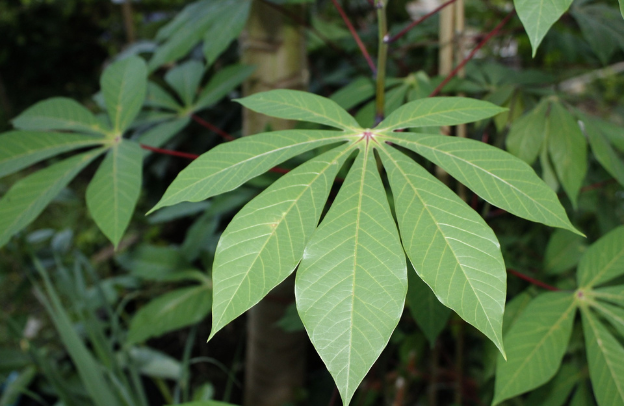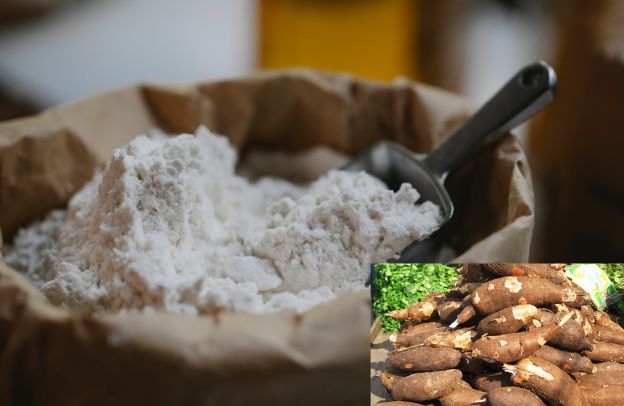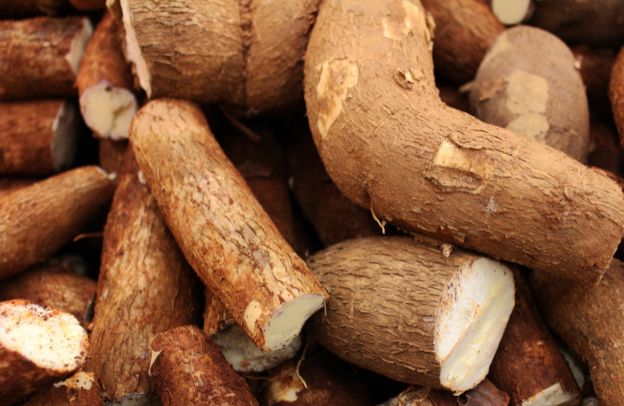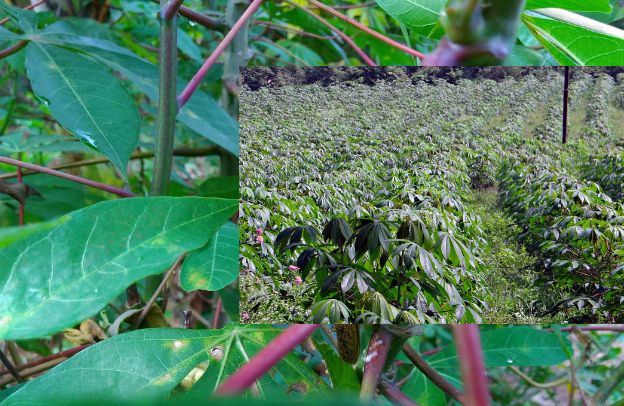How To Plant Cassava In Nigeria And Tropical Africa

Cassava is a tuberous root that can be ground into flour for cooking, or boiled to create a starchy, high-carbohydrate food source. It has been a vital crop in Nigeria and tropical Africa for years because it’s easy to grow and provides sustenance in tough times.
Want to learn about Storytelling Skills and Content Creation Strategy? Then, Join our Content Academy.
Cassava is more resilient than other crops like maize, melon, or grains when it comes to pests and climate conditions, cultivation, harvest, and most importantly, being transformed into other food staples like garri, fufu, floor, and more.
Now, considering its flexibility, cassava is largely produced annually than most crops. Though there are no festivals held in Nigeria to celebrate the harvest of Cassava like it’s been done for Yam. But we still can’t neglect its vitality in our various homes.
In Eastern Nigeria, for example, Igbos love to transform their cassava crops into Fufu and accompany it to their stomachs with a freshly, mouthwatering soup like Egusi or bitter leaf soup (Ofe Onugbo in igbo).
Cassava wasn’t common in west Africa until the sixteenth century when different crops were shipped from America down to the interiors of Africa. That’s to say, Cassava originated in South America although, different people in Africa invested knowledge and effort into the molding and transforming of cassava into various stables.
Cassava (Manihot esculenta) is a woody shrub from the spurge family and compared to other root tuber crops, it survives in volatile climates compared to other root tubers crops.
It’s usually planted after several crop rotations because of its ability to yield even when the soil nutrients have been reduced. And in some cases, Cassava is planted alongside crops like yam, maize, okra, and plantains.
Planting cassava in the same field every year, however, warrants pests, diseases, and unyielding of the crops which is why it’s good to stop cultivating cassava in the same field annually.
Adding fertilizer is important when growing cassava but if the soil has much-needed nutrients then the crop will grow on its own without the application of fertilizer.
Best Weather Conditions For Growing Cassava
Cassava blossoms in tropical areas or greenhouses as it needs constant rays of sunlight to grow. Frosty weather shrivels the crops and prevents their ability to grow.
Hence, the best climate to cultivate your cassava is between 25° to 29°C. A slight stretch of rainfall between 1000 to 1500 mm is also needed for the appropriate growth of Cassava. There are little chances of Cassava flourishing in semi-arid conditions with 500 mm of rainfall and in cases like this, it will have a competitive advantage over other crops in the field.
When sown in tropical areas with a warm climate, cassava can yield in the span of 8 months, unlike other root tubers.
Soil Condition For Planting Cassava
The soil condition plays an important role in the growth of Cassava. However, Cassava can grow in different soil types that drag in enough rays from the sun. Though it has the capability to blossom in various soil types, the best-deemed type of soil for Cassava is loamy soil that’s well-drained, and stacked with salient nutrients such as phosphorus, nitrogen, etc.
The soil is expected to be tilled and all the weeds that can hamper its growth removed. Hence, before venturing into planting your cassava crop, Bush clearing should be exercised first.
The Uses Of Cassava
As aforementioned, cassava can be used for various things. It serves more as a food crop to Nigerians than a cash crop which spurs its reason for being mass-produced by farmers.
Cassava is also used in industries for the production of papers, flour, starch, pharmaceuticals, etc. More recently, its flour is being used in the baking of bread as well as other confectioneries.
Being a regular food staple, it’s processed into garri and fufu.
Plus, Cassava leaves serve ornamental purposes. In most tribes in Nigeria and other parts of Africa, it’s used as leaves for soup and animal staples (especially goats).
Some Health Benefits Of Cassava
Essentially, Cassava serves as one of Nigeria’s food staples but we can’t ignore its benefits to health.
Gives energy
Being a carbohydrate-rich staple, cassava charges us with energy in whatever form it’s being processed and consumed. In Igbo land, it’s especially scarfed down during lunchtime so as to brim workers like bus drivers, farmers, goods-lifters, and the like with the right amount of strength to pursue their work.
Provides Vitamins And Minerals
Granted cassava is one of the core sources of carbohydrates, it has in store some vitamins and minerals such as potassium, iron, and calcium which nourish our health.
It helps to heal wounds faster
with the right amount of vitamins and minerals in your body when you consume cassava, the possibility of wound healing becomes faster.
Reduces Weight:
One surprising thing about Cassava staple is that it fills the stomach easily. For instance, when you consume fufu, you can barely take more than eight swallows and your stomach gets filled.
Consequent to its ability to fill a stomach faster, you will be able to down huge amounts of food, thereby leading to weight loss.
Steps To Plant Cassava
Cassava cultivation in Nigeria is the same everywhere. Same as other countries in West Africa. That’s because of the same climate conditions. Here are the steps of cultivating Cassava.
Site selection and clearing
This is a must when cultivating other crops and of course, it isn’t different when it comes to cultivating cassava.
When you draw a conclusion on when to begin cultivating your Cassava, you should first and foremost decide on the best site to cultivate.
Of course, you should consider how well the sun rays, rain, and air seep into the field.
After you’ve decided on the site, clearing it is of utmost importance. Your Cassava won’t grow well in sites ridden with weeds, pests, and disease vectors no matter the high resilience of the Cassava type.
The site clearing can be done with tools like a hoe, cutlasses, etc. Most people resort to hand-clearing measures in order to retain useful soil nutrients but the chances of extracting pests and disease vectors are low.
Another measure worthy of note when clearing the site is bush burning. Though it’s been argued a number of times that the nutrients in the soil will wither, still it all depends on how you handle the burning process.
Rarely do people know that the ashes of burnt leaves add more potassium salt into the soil to help crops grow. Mostly, Bush burning will kill all disease vectors and pests embedded in the soil.
You can as well spray some herbicides and pesticides before cultivating and a few after planting your Cassava for the constant growth of the crop.
Planting Of Cassava
There are various methods you can apply when planting your Cassava such as horizontal, vertical, and inclined planting methods.
Before concluding on which of the method to apply, you should decide on the variety of cassava to plant.
It’s of prime importance to select a variety that has high resistance to disease and pests and is able to yield properly.
After that, then you can venture on planting your Cassava with any of the above-stated planting methods.
Fertilization of cassava
Cassava needs fertilizers to grow but it’s not of the essence if your site has the needed nutrients. In cases where the site has been cultivated for years or subjected to Bush burning process, you can decide to add fertilizers to the soil to help heighten its nutrients.
It’s best to use organic manure as fertilizers such as chicken and cattle droppings. Also, the remnants of leguminous plants equally serve as manure.
When all these steps are taken the cassava will blossom and in the span of eight months it’ll ripe and be ready for harvesting.
Conclusion on How To Plant Cassava In Nigeria And Tropical Africa
Cassava is a starchy, high-carbohydrate root that can be boiled to create a wonderfully nutritious food source when eaten as a paste. It’s easy to grow and provides sustenance for many small villages in Nigeria.
The cassava crop serves both family and entrepreneur interests. In families, it serves as a staple for different dishes and provides us with essential nutrients for good health. To entrepreneurs, it’s one of the best profitable businesses that can be established with little or no capital.
If you find any value in this post, share also with your friends who might need it. Join our Content Academy if you want to learn about Storytelling Skills and Content Creation Strategy.





